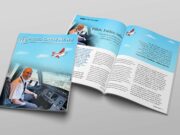
If you’re a pilot feeling stressed about your finances, you’re certainly not alone. Numerous studies have shown that worry about money is one of the biggest concerns in our lives.1 And the fact is, that type of worry can impact virtually anyone.
I wish the answer to alleviating that stress were as simple as taking a walk along the beach or in the woods. But, unlike free floating anxiety about, dare I say it, politics or COVID-19, feeling stressed about money is a cause and effect equation. That means there are several things you can do about the effects if you focus on eliminating the cause.
First, a quick aside about stress: No matter how much you hear about it, the fact remains that stress and worry are terrible for you, both physically and mentally. How so? Chronic stress not only contributes to heart disease, insomnia, depression, high blood pressure, and a higher risk of stroke, it can increase our desire for sugar, drugs and alcohol, and even reduce our reaction times. Simply, stress is the insidious, silent killer of your entire good-health supply chain that needs to be managed and kept at bay.
Yet when it comes to our finances, the stress we experience doesn’t usually derive from something as simple as worrying about whether we have enough money. Too often, it’s due to the energy it takes to manage the many components of your finances, along with the frustration that you don’t have a plan in place that makes you feel in control.
Having been in the financial and advisory sector for more than 20 years, I long ago learned that, unlike politics or COVID-19, there are things you can do about many of the financial stressors in your life.
First, let’s begin with what I believe is the simplest remedy. I suggest you start tracking your spending. And the way I want you to do this is to start physically writing (yes, actually writing) down in a little notepad every time you spend money.
Have you ever said to someone, “I don’t know where my money goes?” I’ve seen this terrific little habit of writing down every expenditure transform lives. (It’s one of those things that, once you begin, you may never stop.) This small step will in-fact help you feel more in control by making every outgoing dime tangible (the way things used to be when we paid cash) instead of abstract (the mindless swipe of a card). Doing so can help you conserve money because it not only brings you closer to what you spend, it gives you a chance to quickly reflect on each purchase.
The next thing I recommend you do (if you’re stressed about your finances) is probably the hardest. Deal with your debt once and for all. When I work with someone who is feeling stressed about money, roughly 75% of the time, it’s due to debt. That’s because, not only is debt scary, but I’ve often consulted with people who have said that debt made them feel ashamed.
With that in mind, probably the #1 source of “bad debt” (assuming you don’t owe money to bookies or casinos) is credit card debt. And if you’ve carried a balance on your credit cards for more than six months, it’s out of control.
Write down your various credit card balances, identify the highest interest rate, and then massacre it. Pay the minimum on every other card and put everything extra that you have into that one obligation. And, once it’s paid off, go after Card #2, and so on.
Now, there is the “snowball” method, that stipulates you go after the smallest balance (regardless of interest rate) first, which, from an emotional standpoint, has some advantages. You lop off one card, hopefully quickly, and then go on to the next. But financially, it’s typically best to go after the most expensive card with the biggest interest charges (and don’t forget about yearly fees) first. As with tracking your spending, knocking down debt will relieve stress and worry to make you feel more in control.
Another big source of financial stress and anxiety revolves around investments and allocations. Everyone’s time horizon (the amount of time before you need to tap into your savings) and risk tolerance (your investment risk exposure and how it affects you) are unique. But make no mistake, if you are someone who watches the market every day, are upset when it goes down and feels euphoric when it goes up, or you’re someone who is nearing retirement and is going to need that money soon, generally, your investment allocation should probably be somewhat more conservative. That’s because the way your investments are allocated is causing you to be emotional, and while that feels good on certain days, it’s causing you financial stress because you feel at the mercy of something over which you have no control – the performance of the markets.
Of the above three ways to help reduce financial stress, the third, how your investments are allocated, is the most wide-ranging and nuanced. Typically, whether you have a brokerage account and you work with an advisor to manage your investments and savings, or you have a retirement account such as an IRA or a 401(k), investments need to be continually monitored, rebalanced and reallocated based on your age, changes to your financial (or employment) situation, the economy, forward-thinking tax considerations, and more.
What I often explain to a new client is, that along with investment recommendations and debt management, one of the most important functions of my relationship with them is my ability to look at their financial situation dispassionately, unemotionally. I help protect clients from making many of the worst (and often longest lasting) behavioral and emotional mistakes.
Sometimes, working with someone involves telling them things they don’t want to hear about their debt, spending, savings and/or investments. Though these can be hard conversations, more times than I can count, the folks to whom I’ve had to tell difficult things are often those who later, appreciate it the most.
In that sense, because I strongly believe that what I do helps people live better financial lives, in addition to the three things I recommend you do to help relieve stress (write down expenses, pay off debt, and assess your asset allocation), I also recommend you work with a qualified, experienced, fiduciary financial advisor. Not only should that both lessen and simplify the burdens of managing your money, an advisor can help hold you accountable to the better instincts of your financial life. A qualified advisor should help you set reasonable expectations while explaining exactly what you need to do to reach your long-term financial goals.
Truth be told, as an advisor who specializes in working with pilots and their families, nothing is more personally fulfilling to me than helping to keep hard-working pilots and their families happy.
























































